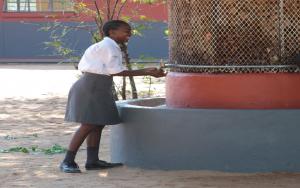Strengthening schools to ensure safe continuity of education amidst COVID-19
COVID-19 calls for resilient school environment that ensures continuity in education and services beyond academic delivery. Available data suggests that COVID-19 have limited direct burden on children’s health, accounting for about 8.5% of reported cases globally, and very few deaths. In contrast, prolonged school closures seem to increase the risk of exposure to violence, neglect and exploitation, early and unintended pregnancies and school dropout. Global estimates suggest that up to 60% of time-on-task for in-school learning has been lost since March 2020 (UNICEF 2021). Anecdotal evidence from Namibia suggests that some learners may have missed more than 7 cumulative months of teaching and learning.
Namibia interrupted face-face teaching on 25 June – 4 August 2021 after witnessing a surge in new infection including amongst teachers and learners. During the peak of the 3rd wave, the country’s positivity rate fluctuated between 28% to 48%. A cross sectional analytic study was conducted in schools with high number of learner infections in April 2021. The study determined that outbreaks in schools occur in parallel with cases in the community. Hence schools are not isolated super-spreader venues but rather part of the bigger picture of community transmission.
Jointly the Ministry of Health and Social Services and Ministry of Education Arts and Culture are implementing an integrated school health programme with support from the United Nations (WHO, UNICEF, UNESCO and UNFPA), CDC and other partners. Through this programme the government established a multi-sectoral committe for the Education Sector to respond to COVID-19, and other health and safety related challenges in and around school communities.
As part of this programme, over 200 Regional School Health Task Force (RSHTF) members were trained in Zambezi, Oshana, Erongo, Ohangwena, Oshikoto, Kunene and Kavango West regions. The trainings were in response to the ongoing pandemic and aimed to help schools prepare and respond better and minimize risk of infection at schools. Specifically, the trainings intended to:
- Refresh and Revive Regional School Health Task Forces.
- Oriented the RSHTF on their roles and responsibilities and promoted multi-sectoral coordination and collaboration.
- Trained on Infection Prevention and Control, including COVID-19 prevention and control in school settings.
- Sensitized the RSHTF to the new Integrated School Health and Safety Policy and the Integrated Policy on HIV Prevention, Management and Wellness for the Education Sector.
- Developed Regional work plans to implement the Health Promoting School Initiative Programme and ensure synergies at national and regional level.
In order to reduce the impact of COVID-19 in and around school communities, the two Ministries in collaboration with the United Nations (WHO, UNICEF, UNESCO and UNFPA), CDC, the Namibia National Teachers Union( NANTU), the Namibia National Students Organization (NANSO) and NAMPOL conducted a national and regional campaigns to address hesitancy and increase vaccine uptake amongst teachers and other staff within the education sector. The vaccination campaign was complemented by mass media communication on COVID-19 infection prevention and control with child focused and child friendly materials.
The National Integrated School Health Task Force is also collaborating with the National Police Force to integrate COVID-19 prevention among the school communities into an existing campaign named ‘#keep me safe from alcohol and drugs” to also include ‘#keep me safe from COVID-19 in schools”. The campaign is aimed at ensuring the compliance of the learners and other school staff to the preventive measures for COVID-19 on the school premises as well as during their traveling to and from school. The virtual training involved police officers from 11 regions while the other 3 regions were trained through face to face in their respective regions.
COVID-19 has reminded us of our vulnerability to disease outbreaks and communicable diseases, which affect the mental health and psychosocial well-being of individuals and communities. COVID-19 has disrupted all areas of society, including services that are vital for child protection. These services have not stopped but it has been harder at times to reach children in the home, where we know violence can occur unseen. The pandemic has also caused increased levels of anxiety and depression, which has affected teachers and learners alike. On top of this, the pandemic has contributed to the economic breakdown, which has also resulted in increased levels of anxiety and depression, including amongst learners who often acutely feel the pressures experienced by their families and caregivers. The need for psycho-social support services especially following the 3rd wave and re-opening of school necessitated targeted interventions of first line support to leaners and school staff to address issues related to bereavement, anxiety related to academic performance and pain due to loss of colleagues and learners.
To this effect the Education Ministry with partners trained 256 life skills teachers on the provision of psycho-social and mental health support to learners and colleagues to promote well-being and prevent or reduce risk of mental illness and psychosocial problems as well as to build resilience. Life skills teacher are then expected to provide first line support to their colleagues and learners who were affected by the COVID-19. With this, government hope to reduce long term effects related to the trauma experience during the 3rd wave and create a conducive and caring environment for teaching and learning. The trainings were conducted in eight regions (Khomas, Hardap, //Kharas, Oshana, Ohangwena, Oshikoto, Kavango West and Kavango East) with plans to roll out to other regions.



